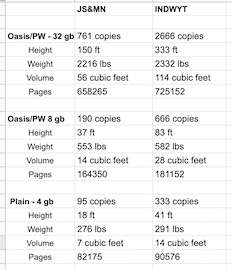The short answer is, of course, “it’s complicated.”
Behind the Math
Book and file size, however, is infinitely more variable. Books themselves have a hugely variable number of pages; translating that into file size requires taking the cover, table of contents, and any illustrations into account. One can easily go down a rabbit hole, from which one can only escape by climbing up on the ever-growing TBR pile. This requires parameters if one is ever going to get anywhere. I did a quick Google search and polled my friends to brainstorm the best way to calculate, and came up with a plan. We crowdsourced books in somewhat arbitrary categories of “Biggest Books We Can Think Of,” “Average-Sized Books,” and “Novellas.” Kindle files are proprietary, natch, so the file sizes are different from ePub files. Figuring out the conversion of page number to file size is not an exact science due to aforementioned factors. I needed to pick actual books to use as an example. For the Biggest Books We Can Think Of, Richardson’s Clarissa topped the list—and rightfully so, since it’s on the top 10 list of the longest novels ever published—along with my personal favorite, Jonathan Strange & Mr. Norrell, which at 865 pages and 4.6 mb is substantially shorter than my 1330-page edition of Les Miserablés, but public domain books tend to have smaller file sizes (2.6 mb in this case) so they throw off the data. (P.S. Did you know Susanna Clarke finally has a new book coming out? I’m so excited!) Average-sized modern books seem to have a similar file size despite half as many pages. Tommy Orange’s There, There is 5mb, and Yaa Gyasi’s gorgeous Homegoing is 4mb, yet they are 304 and 320 pages, respectively. One of the best books I’ve read in 2020 is I’m Not Dying With You Tonight by Kimberly Latrice Jones and Gilly Segal, coming in at 1.2mb and 272 printed pages, so we’ll use that one. And lastly, novellas. As you’ve probably noticed, page count and file size don’t seem to have a linear relationship; Seanan Maguire’s Every Heart a Doorway is 174 pages and 1.1mb, while Martha Wells’s All Systems Red is 155 pages and 2mb. So I’m using my authorial privilege and will be comparing only giant to average-sized books. Whew. Now, are you ready for data? I love data.
To The Data!
First, the data on the books:
And now the different Kindles:
The short answer to “how many books can a Kindle hold?” is: a lot. Height-wise:
333 feet is 1.1 times as tall as the Statue of Liberty. 150 feet is the height of the Chicago Water Tower. 83 feet is almost twice as tall as a Brachiosaurus. 41 feet is just shy of one Brachiosaurus tall, or slightly taller than the average telephone pole. 37 feet is twice the height of an average giraffe. 18 feet is 2.5 times as tall as André the Giant (RIP).
Weight-wise:
2200 pounds is roughly the weight of two grand pianos, or one half of a giraffe or rhinoceros. 550 pounds is the weight of an average domestic pig, or half of a polar bear. 300 pounds is almost 2 15.5-gallon kegs of beer, or almost 2 full-grown male kangaroos.
Volume-wise:
114 cubic feet is 4.5 hot tubs, or 20 bathtubs 56 cubic feet is 10 bathtubs, or 950 ostrich eggs. 28 cubic feet is 5 bathtubs, or 1500 20-oz lattes. 14 cubic feet is 2.5 bathtubs, or 1000 baseballs in their packaging. 7 cubic feet is 1.2 bathtubs, or 3.5-15.5 gallon kegs of beer.
And pages-wise, I consider myself a medium-fast reader and have a goal of 72 books this year. So far I’ve read 45, comprising 16,570 pages. If I keep on at this pace, I’ll hit 33,000 pages read this year, which means that even the smallest version of the Kindle will hold enough books to get me through until December 2022. Are you feeling more comfortable with the sheer volume of books that can fit on a Kindle? Great! Time to go download the 50 Best Kindle Unlimited Books You Can Read in 2020, or the 20 Best Kindle Free Books You Can Read in Isolation, or both! After all, you’ve got the room!


